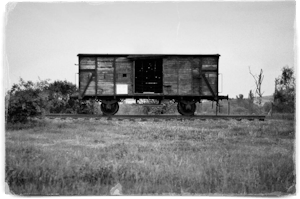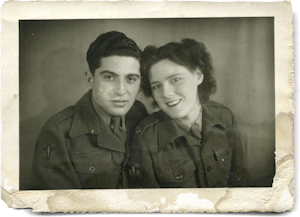Eugene Black
Born in Czechoslovakia, Eugene and his family were imprisoned in a ghetto in 1944 before being deported to Auschwitz-Birkenau and Mittlebau-Dora. He was liberated from Bergen-Belsen and made a new life in Britain.



Eugene was born Jeno Schwarcz in Munkacs (or Munkacevo, now in Ukraine) in Czechoslovakia in 1928.
Eugene lived with his parents, three sisters and one brother – Eugene was the youngest. His mother came from an orthodox Jewish family but his father, who was a master tailor, did not. The family were prosperous and outside the home, Eugene enjoyed school and loved sports, especially football, playing centre-half for the school team.

“I came from quite a comfortable home, never knew what hunger was or to be deprived of anything.”
In November 1938, the area where Eugene’s family lived became part of Hungary. On 19th March 1944, German forces occupied Hungary. All Hungarian Jews were ordered to wear the yellow star and within ten days, the Jewish population was forcibly relocated into ghettos. Eugene’s home was located within the ghetto, so they did not have to move, but his family had to take other people into their home.
Life for Eugene again changed drastically on 14 May 1944. Eugene was returning home from school when he saw a German military lorry outside his home with his sisters and father on board. He watched an SS man hit his mother across the face and force her onto the lorry. Eugene was then pushed onto the lorry with his family and others from the ghetto. Arriving at a nearby brickyard, everyone was forced into cattle wagons. There were 120 people per wagon, with no food, no seats, a barrel of water between them, and a bucket for a toilet.


Eugene’s transport was the first Hungarian transport to arrive in Auschwitz-Birkenau. On arrival, Eugene was swiftly separated from his mother and sisters, then also from his father. After being completely shaved and then showered, Eugene was given his prisoner number, 55546, and a striped uniform. Similar to other arrivals at that time, he was not tattooed.
Eugene remained at Birkenau for around ten days before being selected for slave labour, being sent via Buchenwald to Mittelbau-Dora in the Harz Mountains, where the Nazis used slave labourers to manufacture V1 and V2 rockets underground. Eugene’s job was to load small trucks with rocks dug out from the tunnels for 12 to 14 hours each day, without rest, and on starvation rations. Eugene spent five months in Mittelbau-Dora.
Eugene was transferred to Harzungen, a sub-camp of Buchenwald, to build barracks for other prisoners being evacuated from the east. But he became ill with pneumonia and was taken into the camp hospital. Weakened and starving, he rested for ten days and remembers that an elderly Luftwaffe doctor treated him well.


“That German doctor used to come in every morning and, as he came through, he used to say, “Wo ist mein kleine Jude?” (“Where is my little Jew?”)
In mid-March 1945, Eugene and the other camp inmates were taken on cattle wagons on a seven-day journey without food or water to Bergen-Belsen. Eugene described Bergen-Belsen as “a hellhole”. Typhus ravaged the camp and there was no sanitation. Food was scarce and Eugene remembers searching the pockets of dead inmates for crumbs. Just over 500 inmates of the original three thousand on Eugene’s train survived.


Eugene was liberated on 15 April 1945 by the British Army. He had been reduced from a fit 75kg 16-year-old, who loved playing football, to barely 30kg. He was soon transferred to Celle, an ex-Luftwaffe barracks which became a displaced persons camp, to recover his strength.
Eugene soon discovered that he had lost his whole family, except for his elder brother. Eugene was only 17 years old and was homeless and stateless. But as he was resourceful and hardworking, he became an interpreter for the British Army and, in 1946, moved to Sennelager, Germany. Two years later, he met his future wife Annie, a British woman working for the British military. He described Annie as his saviour.


In 1949, they moved to England, married and had four children. Eugene worked for Marks & Spencer for 35 years, starting as a warehouse man in Manchester, rising to become a store manager and eventually settling in West Yorkshire. He became a British citizen in 1960.
Eugene worked tirelessly to educate young people about the Holocaust and to spread his message of love, tolerance and hope. He passed away in September 2016 and is sadly missed by all who knew him.

“I think every one of us has a responsibility to do our utmost to remember those events and make sure they never happen again.”


Can you help us?
Without the work of charities like ours, stories like Eugene Black's will be lost and forgotten. Please donate generously to ensure that Eugene's story can a force for good in the modern world.
- £
